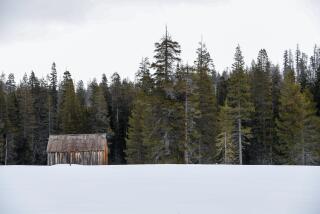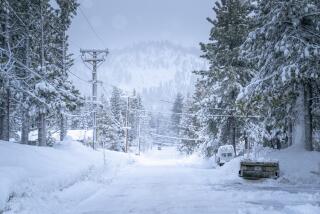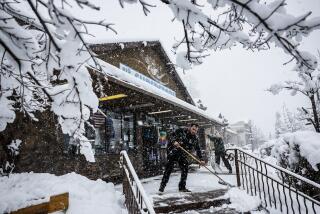El Niño bringing California a big snow season
The last two years of drought have been tough for Lincoln Kauffman and others in the Northern California skiing business.
Kauffman, general manager of the 550-acre Donner Ski Ranch just north of Lake Tahoe, said a lack of snow had dramatically curtailed the ski season, sometimes to just a few weeks. Last year, the Donner slopes were open for only 44 days of skiing, Kauffman said.
But on Monday, as the first flakes from a storm forecast to blanket the whole Sierra Nevada fell outside Kauffman’s window, he said there wasn’t just snow in the air, but optimism — the kind no one has dared to feel in years.
Thanks in part to El Niño, a series of strong storms have blanketed the Sierras with snow. Another storm this week is expected to deliver another layer of the white stuff — and draw skiers back to resorts.
“This is the earliest the ski resorts have been opened in many years. ... They rarely open before Thanksgiving,” said Bill Patzert, climatologist with NASA’s Jet Propulsion Laboratory in La Cañada Flintridge.
Experts say the snow boom should continue into next year thanks to El Niño, which is expected to dump large amounts of rain — and snow — across much of California.
The snow is good news for California’s ski business, but it also comes with risks. Officials warned of dangerous road conditions across the Sierra this week. And over the weekend, officials said a UCLA graduate student who went missing earlier this month was found buried in snow after an avalanche came crashing down in the John Muir Wilderness.
The first storm that hit earlier this month left up to 36 inches of snow on Mammoth Mountain’s summit and 18 inches at Lake Tahoe.
It was that storm that allowed Mammoth resorts to open early, officials said.
Daily skier visits are nearly double what they’ve been at this time the last two years, said Joani Lynch of Mammoth Resorts. Many hotels are also nearing full capacity, with the peak season still a month away, tourism officials said.
The new storm expected to dust the state Tuesday and Wednesday will drop up to another 18 inches, said National Weather Service meteorologist Nathan Owen. Mountain passes may be closed or buried and visibility will be limited. But after the snow passes, the cold will remain, Owen said.
“With all these storms coming right after another, it’s a really good time for us,” said Lara Kaylor, a Mammoth Lakes tourism spokeswoman.
These early season storms are a sign of the upcoming El Niño, experts say. Though the storms originated in the Gulf of Alaska, the fact they reached Northern California and with so much snow indicates El Niño’s water-warming influence has reduced the high-pressure system that usually deflects them, said Patzert.
This is the earliest the ski resorts have been opened in many years. ... They rarely open before Thanksgiving.
— Bill Patzert, climatologist with NASA’s Jet Propulsion Laboratory in La Cañada Flintridge
“It’s been a couple of years since we’ve had this kind of potential,” Kauffman said. “People should really be up here enjoying it. When there’s white stuff on the ground, better not wait for a better situation down line.”
He and others in ski country hope El Niño will bring a winter of snow, but they remain only cautiously optimistic.
“Everybody’s saying ‘El Niño,’ on and on and on. We’re kind of like Missouri: Show me,” Kauffman said. “Generally in town and around, it’s cautiously optimistic … but definitely better than last couple of years.”
The upbeat mood was tempered by the dangers the snow brings.
Search-and-rescue crews used sonar technology to find Michael David Meyers, 25, under the 60- to 70-foot-long avalanche area, said Inyo County Sheriff William Lutze. Meyers suffered massive injuries, including broken bones, during his fall, he said.
“It’s like being in a head-on accident at 100 mph,” Lutze said.
The last time anyone heard from Meyers was Nov. 5, when he texted his roommate to say he was going to Mt. Russell in Inyo National Forest.
At the time, the area was being slammed by a winter storm. The mountains were blanketed with heavy snow and 100-mph winds blew through the canyons, he said.
Avalanches are not unusual for the area, especially after snow builds up and forms a cornice, sending overhanging snow crashing down. Navigating dense, snow-packed mountains requires skill and experience and should be attempted only in pairs, the sheriff said. Fatalities are not uncommon.
“If it doesn’t look safe, it’s not safe,” Lutze said.
According to authorities, Meyers was an experienced hiker and climber. He enjoyed cold-weather camping and had drawn up a detailed itinerary for his travels, Lutze said. Search-and-rescue crews used the itinerary to track his movements.
About 40 searchers from throughout California began looking for Meyers on Nov. 18 after a resident spotted a vehicle parked under trees and heavy snow on a service road.
Authorities confirmed the vehicle belonged to Meyers.
Aided by a California Highway Patrol helicopter and a California National Guard Boeing CH-47 Chinook, search crews set off the next day. On Friday, volunteers found a helmet and a beanie below the avalanche’s path. Authorities believed the items belonged to Meyers.
The next day, crews used sonar equipment along the patch of avalanche to find Meyers’ body.
Meyers, a Minnesota native, was studying physics.
UCLA will offer counseling to students and staff mourning his death.
“We join together in offering our deepest condolences to all of Michael’s family and friends,” the university said in a statement.
An autopsy is pending.
Twitter: @JosephSerna
Times staff writers Rong-Gong Lin II and Rosanna Xia contributed to this report.
MORE ON EL NINO
El Niño may trigger floods, famine and sickness in much of the world
Massive El Niño gains strength, likely to drench key California drought zone
More to Read
Start your day right
Sign up for Essential California for news, features and recommendations from the L.A. Times and beyond in your inbox six days a week.
You may occasionally receive promotional content from the Los Angeles Times.







